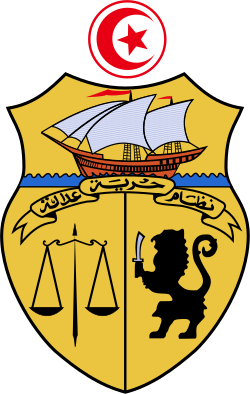| Country | Formal Relations Began | Notes |
|---|
 Armenia Armenia | | See Armenia–Tunisia relations - Armenia is accredited to Tunisia from its embassy in Cairo, Egypt.
- Tunisia is accredited to Armenia from its embassy in Moscow, Russia.
|
 Azerbaijan Azerbaijan | 1 July 1998 | See Azerbaijan-Tunisia relations - Diplomatic relations between the Republic of Azerbaijan and the Republic of Tunisia were established on July 1, 1998. [116]
- Relations between Azerbaijan and Tunisia have been developed within the framework of international organizations, including the UN and OIC. [116]
- Azerbaijan is accredited to the Republic of Tunisia through its ambassador in the Kingdom of Morocco. [116]
|
 China China | 10 January 1964 | See China–Tunisia relations Both countries established diplomatic relations on 10 January 1964 [136] - China has an embassy in Tunis.
- Tunisia has an embassy in Beijing.
|
 India India | | See India–Tunisia relations - India has an embassy in Tunis.
- Tunisia has an embassy in New Delhi.
|
 Iran Iran | | See Iran–Tunisia relations In May, 2005, Tunisia signed with Iran an agreement for cooperation in air, sea, and road transportation. It was signed on the visit of Tunisian minister Abderrahim Zouari to Iran. [137] - Iran has an embassy in Tunis.
- Tunisia has an embassy in Tehran.
|
 Iraq Iraq | | - Iraq has an embassy in Tunis.
- Tunisia has an embassy in Baghdad.
|
 Israel Israel | | See Israel–Tunisia relations - Israel had an interest office in Tunis between 1996 and 2000.
- Tunisia had an interest office in Tel Aviv between 1996 and 2000.
|
 Japan Japan | | Tunisia and Japan have a visa agreement, Tunisian people traveling to Japan and Japanese people traveling to Tunisia do not need a visa, as long as their stay do not exceed 3 months. Japan also supports Tunisia, with equipment and money donations. Both countries had friendly relations since Tunisia's independence in 1956. Since 2015, Tunisia and Japan are allies under the Major non-NATO ally agreement. - Japan has an embassy in Tunis.
- Tunisia has an embassy in Tokyo.
|
 Lebanon Lebanon | | Tunisia and Lebanon share historical and civilizational ties. In June, 2010, the Tunisian Prime Minister Mohamed Ghannouchi and his Lebanese counterpart Mr. Saad Hariri chaired a Tunisian-Lebanese working session. Both countries want to energize the process for the Euro-Mediterranean Partnership. In addition, Tunisia reaffirmed its support of Lebanon. [138] - Lebanon has an embassy in Tunis.
- Tunisia has an embassy in Beirut.
|
 Malaysia Malaysia | | See Malaysia–Tunisia relations - Malaysia is accredited to Tunisia from its embassy in Algiers, Algeria.
- Tunisia is accredited to Malaysia from its embassy in Jakarta, Indonesia.
|
 Pakistan Pakistan | 28 May 1958 | See Pakistan–Tunisia relations Both countries established diplomatic relations on 28 May 1958. [3] - Pakistan has an embassy in Tunis.
- Tunisia has an embassy in Islamabad.
|
 Qatar Qatar | | See Qatar–Tunisia relations Qatar is among the largest Arab investors in Tunisia. [139] Relations between Qatar and Tunisia improved immensely between 2011 and 2013, when Ennahda Movement-affiliated candidate Hamadi Jebali was declared Prime Minister of Tunisia in the 2011 Tunisian Constituent Assembly elections. Cooperation in all fields gradually started picking up traction; for instance, the two governments signed ten bilateral agreements in 2012. [140] - Qatar has an embassy in Tunis.
- Tunisia has an embassy in Doha.
|
 Saudi Arabia Saudi Arabia | | See Saudi Arabia–Tunisia relations In July 2010, a Tunisian-Saudi non-double taxation agreement was signed in Tunis, by Finance Minister Ridha Chalghoum and his Saudi counterpart Ibrahim Bin Abdulaziz Al-Assaf. The two ministers said this convention will certainly help boost trade exchanges between Tunisia and Saudi Arabia, stimulate investments, and favour exchange of expertise between the two countries. In particular, it will further the Tunisian-Saudi Investment and Development Bank "STUSID Bank" in developing financial co-operation and the contribution of the Saudi Fund for Development (SFD) to boost the development process in Tunisia. The minister highlighted the importance of drawing on the two countries' expertise in the tax and customs field and set up a joint action plan to strengthen co-operation. [141] - Saudi Arabia has an embassy in Tunis.
- Tunisia has an embassy in Riyadh and a consulate-general in Jeddah.
|
 Syria Syria | 2 June 1956 | The 11th session of the Tunisian-Syrian High Joint Committee met in Tunis in May 2010. The two countries share experience and information on such issues as housing, shipping, and tourism. [142] - Syria has an embassy in Tunis.
- Tunisia has an embassy in Damascus.
- Tunisia ceased to recognise the government of Syria on 4 February 2012. During his tenure, Hamadi Jebali, the Prime Minister, called on fellow Arab states to follow its lead: "We have to expel the Syrian ambassadors from Arab countries." [143]
- In 2019, France24 speculated that new president Kais Saied could renew his country's diplomatic relations with Syria. [144]
- Following the 2023 Turkey–Syria earthquake, President Saied decided to strengthen diplomatic ties with Syria. [145]
|
 Turkey Turkey | 1956 [146] | See Tunisia–Turkey relations |
 United Arab Emirates United Arab Emirates | | - Tunisia has an embassy in Abu Dhabi and a consulate-general in Dubai.
- the United Arab Emirates has an embassy in Tunis.
|




